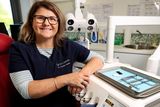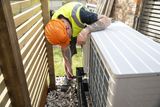Delta danger as 800 cases in last fortnight linked to foreign travel and fully vaccinated among deaths
Dr Ronan Glynn. Photo: Colin Keegan
Foreign travel is helping to fuel the Delta variant spiral, as 800 virus cases were linked to trips abroad in the last fortnight, including among fully-vaccinated people.
Three-quarters of the infections were in the under-35s but positive cases were also found in people who had two jabs but did not wait one to two weeks for protection to kick in.
Deputy chief medical officer Dr Ronan Glynn said although most Covid-19 infections are being picked up here, the number of “travel-related cases has increased very sharply recently”.
His comments come as European travel reopened this week and thousands are availing of a getaway abroad with the EU Digital Covid Certificate. He appealed to unvaccinated people or those who are not immune through infection not to travel.
Read more
He revealed that from July 5 to 18 there were 676 virus cases diagnosed in people who came back from Spain, the UK and Portugal, with the remainder coming from other destinations. This included 317 in people who had been in Spain, 188 in those coming back from the UK and 171 from holidaymakers to Portugal.
He told the recently vaccinated: “People should not consider themselves fully vaccinated until two weeks after their Johnson and Johnson vaccine, one week after their second Pfizer vaccine and two weeks after their Moderna or AstraZeneca vaccine.”
Public health doctors are reporting an “increasing number of cases in people who have travelled overseas very shortly after they have completed their vaccination course”, he warned.
“As disease incidence increases both here in Ireland, and across Europe, it is important that, if you intend on travelling, you are aware of the disease profile in the area you are visiting, as well as the public health measures in place locally.
“If you have recently returned to Ireland and have any symptoms of Covid-19, including fever, cough, headache, sore throat or a blocked or runny nose, then please self-isolate and get tested without delay.”
It comes as it emerged yesterday that fully vaccinated people have been among the Covid-19 deaths and admissions to intensive care.
HSE chief clinical officer Dr Colm Henry said that among the 70 Covid-19 deaths where vaccination status was known between May 14 and July 13, just 12 were fully vaccinated people.
Only two had been vaccinated for more than 14 days when there is full protection. They were all over 65 years of age.
Some seventeen deaths – 24pc – happened in people partially vaccinated and 76pc were over 65.
The majority of deaths, 59pc, occurred in the unvaccinated population, of whom 85pc were over 65.
Separately, six patients fully vaccinated against Covid-19 were admitted to intensive care between March 25 and July 11.
Of the 131 intensive care patients whose vaccination status was known during that time, 20 had one dose.
The majority, 105, were unvaccinated, he said.
Of the 26 patients who were admitted to intensive care and were partially vaccinated, 88pc had an underlying condition.
Dr Henry said there was a need to reduce community transmission not just for the unvaccinated but the vaccinated.
For now “the flood wall of vaccination is holding tight where it matters”, he added.
The average age of people in intensive care is now 52, compared to 62 in the last wave and 67 in the second wave, which shows the younger age groups who are unvaccinated are still at risk, he said.
The most severe harm is still mostly impacting older people and those with underlying conditions.
Some patients are found to have the virus when admitted for another illness.
Meanwhile, another 1,189 more cases of Covid-19 were diagnosed yesterday, down from 1,378 the previous day.
As of early yesterday there were 95 Covid-19 patients in hospital, down from 96 the previous day, with 23 in intensive care, an increase of one.
Testing sites in Dublin, Donegal, Louth, Galway and Meath are particularly busy and additional capacity has been put in place.
In the past 14 days, 75pc of cases have been in those aged under 34.
The HSE is expected to start using antigen tests on close contacts from the end of next week as demand rises.
Read more
Join the Irish Independent WhatsApp channel
Stay up to date with all the latest news
















